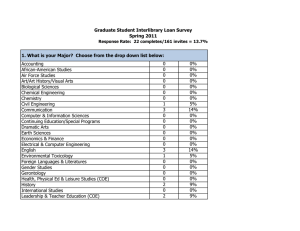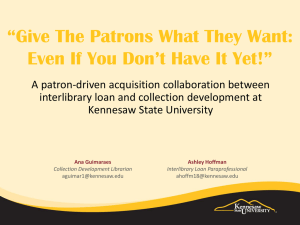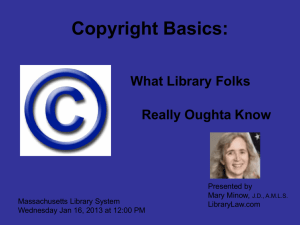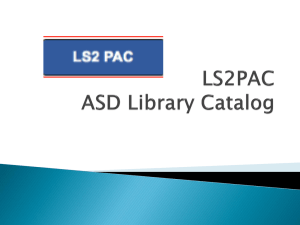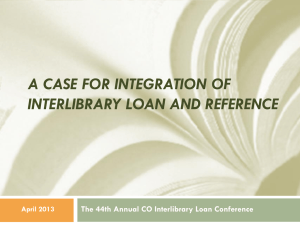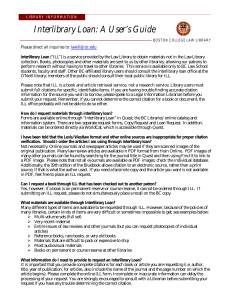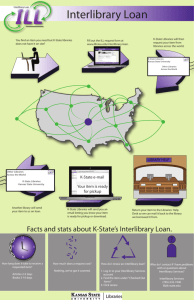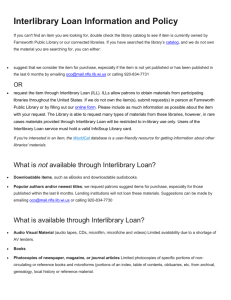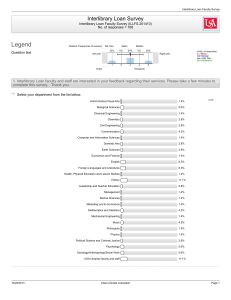Copyright - American Library Association
advertisement
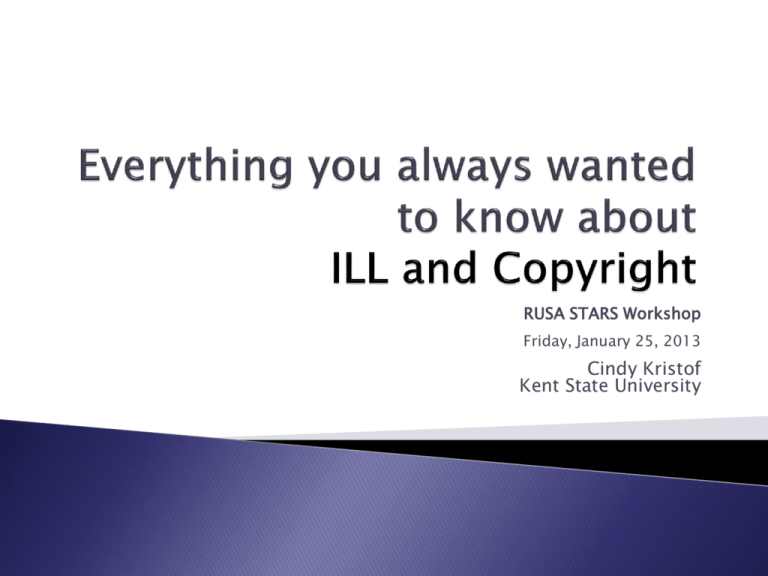
RUSA STARS Workshop Friday, January 25, 2013 Cindy Kristof Kent State University [copyright-protected photo deleted] “…an extensive knowledge of every nuance of copyright law is not required for successful (and legal) operation of an ILL department.” - Lee Andrew Hyler Source: Hyler, Lee Andrew. “Copyright in the Interlibrary Loan Department.” Interlibrary Loan and Document Delivery: Best Practices for Operating and Managing Interlibrary Loan Services in All Libraries. New York: Haworth Press, 2006, pp. 53 – 64. (Simultaneously published as Journal of Interlibrary Loan, Document Delivery, and Electronic Reserve, Vol. 16, no. 1-2, 2006.) Title 17, United States Code • Grants a set of exclusive rights to copyright owners for a limited period of time • Exclusive rights are balanced with exceptions • http://www.copyright.gov/title17/ “The Congress shall have the power…to promote the Progress of Science and useful Arts, by securing for limited Times to Authors and Inventors exclusive Right to their respective Writings and Discoveries.” United States Constitution Article 1, Section 8 Copyright protects “original works of authorship” that are “fixed in any tangible medium of expression.” (Source: Title 17, U.S. Code at http://www.copyright.gov/title17/) Facts Things that are not fixed • Weights and measures • Dates of historical events • Addresses and phone numbers • Impromptu speeches • Choreography that has not been notated or recorded • Ephemeral or transitory items or objects You don’t need to “get” copyright You may mark it with: © [your name] You may register your work at http://www.copyright.gov/eco/index.html • $35 for electronic registration Copyright Law gives copyright holders a limited monopoly over their works, to serve as an incentive for authors and creators. The rights include the following: • • • • • • Reproduce the work in copies Distribute the work publicly Make derivative works Publicly display the work Public performance Public performance by means of a digital audio transmission (Source: § 106, Title 17 U.S. Code at http://www.copyright.gov/title17/) What’s now in the Public Domain? ◦ http://copyright.cornell.edu/resources/publicdomain.cfm ◦ http://librarycopyright.net/resources/digitalslider/ Some things people think are in the Public Domain are NOT… Fair Use – Section 107 First Sale Doctrine – Section 109 Exceptions for Libraries and Archives – Section 108 Four Factors of Fair Use 1. Purpose & Character of Use – e.g., non-profit vs. for-profit – e.g., factual vs. creative; published vs. unpublished – e.g., small portion vs. large portion or “heart” of work – e.g., little effect on market vs. huge impact on market value 2. Nature of Work 3. Amount & Substantiality of Work 4. Effect of Use Fair Use Tools Checklist - http://copyright.columbia.edu/copyright/fairuse/fair-use-checklist/ Evaluator - http://librarycopyright.net/resources/fairuse/ Allows us to borrow and lend “returnables” • • • • • • • Books Theses and dissertations Microforms Videos DVDs CDs Whole issues or bound volumes of journals Section 108 • The copy becomes the property of the user; • Library has had no notice that the copy will be used for any purpose other than private study, scholarship, or research; • Library displays prominently, at the place where orders are accepted, and includes on its order form, a warning of copyright. Section 108 Spinner ◦ http://www.librarycopyright.net/resources/spinner/ Not to be confused with CONFU… “Commission on new technological uses of copyrighted works” ◦ Group of publishers, librarians, teachers, and other stakeholders Pursuant to the Copyright Act of 1976 ◦ Final Report – 1978 http://digital-law-online.info/CONTU/PDF/index.html Chapter 4 - Guidelines on Photocopying under Interlibrary Loan Arrangements Guidelines are NOT law… Provides clarification for Section 108 Attempts to quantify… • “Systemic reproduction” • “Aggregate quantities” Attempts to mitigate effects of library subscription patterns on market and sales Keep records of all BORROWING requests • Filled and Unfilled • Three years • Electronic records are just fine “Suggestion of Five” or “Rule of Five” or “5/5 Rule” • For the BORROWING library • Articles published fewer than five years before date of request • Requesting and receiving six or more articles from a single journal title in a calendar year exceeds this suggestion… Latest five calendar years January - December ◦ ◦ ◦ ◦ ◦ 2013 2012 2011 2010 2009 All ILL photocopy requests from the BORROWING library must include a copyright compliance statement: • CCG • ILL request complies with 108 (g) (2) Guidelines • Falls within Suggestion of Five • CCL • ILL request complies with other provision of copyright law • Falls outside Suggestion of Five In the absence of an automated system, keep track on paper One card for every journal title, with one entry for every RECEIVED article five years old or newer Once you’ve received a SIXTH article that is five years old or newer, you’ve exceeded the Suggestion of Five Clearance for textual works since 1978 ◦ http://www.copyright.com ◦ For ILL Pay royalties on “CCG” photocopies that exceed the “Suggestion of Five” ILL transactions fall under Pay Per Use Options Get It Now service http://www.copyright.com/content/cc3/en/toolbar/produ ctsAndSolutions/getitnow.html Not all publishers work with the Copyright Clearance Center Commercial Document Delivery Services • Copyright fees are included in the price • British Library Document Supply Services • Infotrieve • http://www.infotrieve.com/document-delivery-service Purchase from the publisher • Subscriptions • Issues • Individual articles Other choices for the SIXTH article, or beyond… • Borrow the entire issue (or bound volume), if you can find a library who will lend it • Refer the patron to a nearby library that has the journal • Evaluate situation for Fair Use • Refuse the order/Close the title • http://www.ngcrc.com/ngcrc/page2.htm “Please note that the Journal of Gang Research has no relationship with the Copyright Clearance Center (CCC), and it is not possible to photocopy our materials and then later pay the CCC. We tried that for a few years, it did not work out, there were abuses to our copyrighted materials and we elected simply not to be listed with CCC. Please note that the Journal of Gang Research does not authorize second parties to xerox, photoduplicate, copy or disseminate our articles through Interlibrary Loan arrangements. There are no ‘ex post facto’ prices for violation of our copyrights. Please do not do it. We provide a reasonable, low cost way to get our information, please follow these simple guidelines.” Check for use of CCG or CCL Check your licenses for electronic journals Include copyright statement on copies provided (DMCA, 1998) ◦ Copy the copyright statement on the piece If you cannot locate it, use a stamp Articles being delivered electronically have an electronic stamp “Notice: This material is subject to the U.S. Copyright Law; further reproduction in violation of that law is prohibited.” (Gasaway-Wiant wording) License trumps law Collaborate with Technical Services • Negotiate good licenses • Read and track your licenses • Renegotiate old licenses if necessary Information and Tools • Croft, Janet Brennan, “Interlibrary Loan and Licensing.” Journal of Library Administration, Vol. 42, (3-4), 2005. • ALIAS - http://idsproject.org/Tools/ALIAS.aspx • ERM [copyright-protected photo deleted] eBooks? • Michael Levine-Clark http://blog.oup.com/2012/07/replacing-ill-withtemporary-leases-of-ebooks/ • Heather Wicht http://collaborativelibrarianship.org/index.php/jocl /article/viewFile/163/116 • Linda Frederickson et al. http://www.tandfonline.com/doi/abs/10.1080/107 2303X.2011.585102#preview Berne Convention – Supports International Interlibrary Loan 1886 – originally signed in Switzerland 1988 – United States joined All members of the European Union are also current signatories ◦ Many countries’ laws still only partially conform ◦ “Harmonization” – people live longer lives these days ◦ ◦ ◦ ◦ IFLA’s International Resource Sharing and Document Delivery: Principles and Guidelines for Procedure • 1954 • revised in February 2009 • Copyright is number six of eight guidelines IFLA Position on Copyright in the Digital Environment • “Digital is no different…” • “Contractual provisions, for example within licensing agreements, should not override reasonable lending of electronic resources by library and information staff.” First Sale • Costco v. Omega • Kirtsaeng v. Wiley Document Delivery • International Association of Scientific, Technical & Medical Publishers (or STM) Does the “first-sale doctrine” apply to imported works manufactured abroad? • 9th Circuit Court of Appeals • Blogs Supreme Court http://www.scotusblog.com/case-files/cases/costco-vomega/ An equally divided Court affirmed the Ninth Circuit's holding that the first sale doctrine applies only to copyrighted items that are made and distributed in the United States. (Kagan, J. recused). • Kenneth Crews http://copyright.columbia.edu/copyright/2010/12/16/co stco-omega-libraries-and-copyright/ Textbooks • Blogs “SCOTUS - http://www.scotusblog.com/casefiles/cases/kirtsaeng-v-john-wiley-sons-inc/ Supremely Confusing” by Barbara Fister http://www.insidehighered.com/blogs/library-babelfish/supremely-confusing-kirtsaeng-v-wiley Kevin Smith http://blogs.library.duke.edu/scholcomm/2012/04/1 6/first-sale-goes-to-the-supreme-court-again/ Statement by STM on Document Delivery • http://www.stm-assoc.org/industry-news/stm-statementon-document-delivery/ Michael Kelley – Research libraries, publishers, stake out positions… • http://www.libraryjournal.com/lj/home/891002264/research_libraries_publishers_stake_out.html.csp Kevin Smith - …”a quiet campaign of intimidation regarding ILL, especially ILL between countries…” • http://blogs.library.duke.edu/scholcomm/2011/06/09/asecond-front/ Is your use permitted by law? Is the material within public domain? Does your use fall within agreed-upon guidelines? Can you claim fair use? Is the material licensed for your purpose? Cindy Kristof – ckristof@kent.edu http://www.kent.edu/news/announcements/success/blac ksquirrelanniversary.cfm
